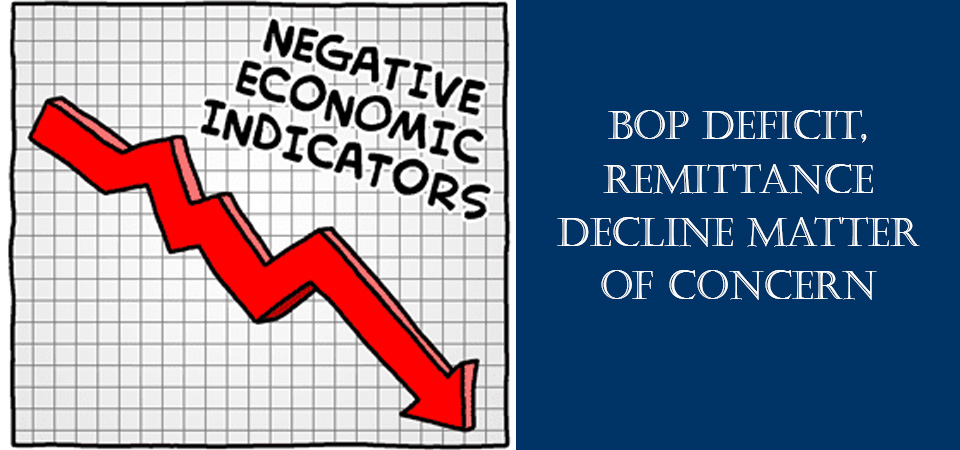Experts worried about negative economic indicators

By Laxman Kafle
Kathmandu, Oct. 5: Nepal’s economy is now in an alarming situation with growing negative macroeconomic indicators, said the economists. The current account, balance of payments and foreign currency reserve have been affected as the flow of remittance shrinks, they said.
Economists said that declining flow of remittances will adversely affect the country’s remittance-based economy.
Stating that the remittance has become a pillar of economy, supporting the national economy to import goods, reduce poverty and manage liquidity in the banking sector, they said that the government should focus on making remittance flow sustainable until and unless the country’s economy becomes stronger on its own .
Economist Dr. Chandra Mani Adhikari said that multiple effects could be seen in the country’s economy following the declining growth rate of remittances, which has been keeping Nepal’s economy afloat.
The negative impact on reference economic indicators --- current account, balance of payment, and foreign currency reserve --- has also been seen with the reduction in the flow of remittances, he said and added that liquidity problem has, of late, been seen in the banking sector.
“There is a challenge in the economy, but there is no need to panic. The government and the concerned authorities, especially Nepal Rastra Bank (NRB), should adopt effective measures in time to overcome the challenges seen in the national economy,” he told The Rising Nepal.
The latest macroeconomic report of NRB showed that the remittance inflows had dived by 18.1 per cent to Rs. 75.96 billion in the first month of the current fiscal year in contrast to an increase of 23 per cent in the same period the previous year.
In the US dollar terms, remittance inflows decreased by 17.5 per cent to 638.2 million dollars in the review period against a growth of 14.5 per cent in the same period of the previous year.
Similarly, the current account remained at a deficit of Rs. 47.90 billion in the review period.
The Balance of Payments (BOP) registered a deficit of Rs. 38.75 billion in the review period against a surplus of Rs. 51.46 billion in the same period a year ago.
Gross foreign exchange reserve has also decreased by 3.2 per cent to Rs. 1353.82 billion in mid-August 2021 from Rs. 1399.03 billion in mid-July 2020.
Dr. Adhikari said that it was more worrying that the foreign currency reserve was declining as it would not be enough to buy goods and services if the reserve was insufficient to buy goods and services for six months.
Foreign exchange reserve of the banking sector is sufficient to cover the prospective merchandise imports for 9.3 months, and merchandise and services imports of 8.3 months, NRB said.
He, however, said that the NRB should control the import of luxurious and non-essential commodities to maintain foreign currency reserve.
Besides, it is a must to pay attention to increase foreign currency earnings through the revival of tourism, export promotion, foreign investment and foreign grants, he said. Economist Dr. Dilli Raj Khanal said that foreign currency reserve and balance of payment will be affected badly if the flow of remittance shrank further.
“Remittances, imports and foreign aids are the major elements of our economy at present. If the remittances are reduced significantly, the overall economy will be affected,” economist Khanal said.
He said that the country’s economy, which was gradually improving, was also affected due to the impact of COVID-19 pandemic.
“Present political instability has reduced the confidence of investors which affects the pace of economic activities. In the meantime, low government expenditure has created liquidity problem in the banking sector,” he said.
Dr. Gunakar Bhatta, executive director at the Nepal Rastra Bank, said that there was a challenge to maintain the macroeconomic stability this year as the growth of remittance inflows had started declining.
“The economic activities, which were affected last year by COVID, have been improving. However, growing import has hit the foreign currency reserve, causing inflation,” he said. He said that the price hikes of imported goods would put pressure on inflation as a large portion of import is used for consumption.
He said that the government should focus on mobilisation of external borrowing to maintain the foreign currency reserve.
Recent News

Do not make expressions casting dout on election: EC
14 Apr, 2022
CM Bhatta says may New Year 2079 BS inspire positive thinking
14 Apr, 2022
Three new cases, 44 recoveries in 24 hours
14 Apr, 2022
689 climbers of 84 teams so far acquire permits for climbing various peaks this spring season
14 Apr, 2022
How the rising cost of living crisis is impacting Nepal
14 Apr, 2022
US military confirms an interstellar meteor collided with Earth
14 Apr, 2022
Valneva Covid vaccine approved for use in UK
14 Apr, 2022
Chair Prachanda highlights need of unity among Maoist, Communist forces
14 Apr, 2022
Ranbir Kapoor and Alia Bhatt: Bollywood toasts star couple on wedding
14 Apr, 2022
President Bhandari confers decorations (Photo Feature)
14 Apr, 2022











